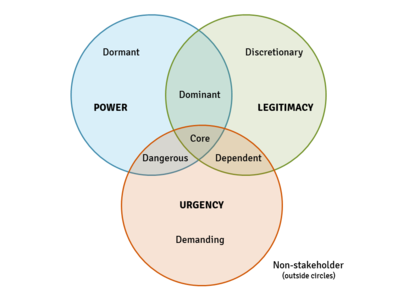Shareholder theory: Difference between revisions
(The LinkTitles extension automatically added links to existing pages (<a target="_blank" rel="noreferrer noopener" class="external free" href="https://github.com/bovender/LinkTitles">https://github.com/bovender/LinkTitles</a>).) |
|||
| Line 29: | Line 29: | ||
In fact, studies reveal that corporations are capable of successfully serving the objectives of multiple stakeholders. The stakeholder theory raises several problematic issues: | In fact, studies reveal that corporations are capable of successfully serving the objectives of multiple stakeholders. The stakeholder theory raises several problematic issues: | ||
* Definition of stakeholders is unclear - stakeholder [[identification]] may be problematic because multiple groups and subgroups may have direct or indirect interest in a corporation's activities. Preston and Baltimore identify four [[standard]] groups: shareholders, employees, customers, and the community. | * Definition of stakeholders is unclear - stakeholder [[identification]] may be problematic because multiple groups and subgroups may have direct or indirect interest in a corporation's activities. Preston and Baltimore identify four [[standard]] groups: shareholders, employees, customers, and the community. | ||
* Manager's role as stewards of interests of all stakeholders may be problematic. Management actions are primarily driven by financial performance thus one may question their ability to pursue objectives of other stakeholders. This is known as an I&We paradigm, where individual utility (shareholder maximization/financial performance) competes with the social “We”, i.e. interests of multiple stakeholders. | * Manager's role as stewards of interests of all stakeholders may be problematic. Management actions are primarily driven by [[financial performance]] thus one may question their ability to pursue objectives of other stakeholders. This is known as an I&We paradigm, where individual utility (shareholder maximization/financial performance) competes with the social “We”, i.e. interests of multiple stakeholders. | ||
* The ability of a corporation to successfully meet the objectives of all stakeholders may be in question. It may appear that different stakeholders may have different objectives. | * The ability of a corporation to successfully meet the objectives of all stakeholders may be in question. It may appear that different stakeholders may have different objectives. | ||
Revision as of 01:41, 21 January 2023
| Shareholder theory |
|---|
| See also |
Shareholder theory was proposed by Milton Friedman and according to him, only and sole purpose of business is to increase profits and value returned to shareholders (owners of the company). Hired managers and CEO's are obliged to serve interests of owners and make money for them, without particular regard to welfare of society or employees. Managers act and decide only according to law without particular interest on ethical or cultural factors.
This way of thinking created problems of short term thinking focused only on profits and not on long term development of the company, managers were pressured to manipulate and doctor financial reports to artificially increase profits (and their own bonuses).
The alternative – stakeholder theory
Stakeholder theory is an alternative approach to understanding the purpose of a corporation. The theory claims that the corporations should serve the interests of all stakeholders rather than shareholders only.
In fact, studies reveal that corporations are capable of successfully serving the objectives of multiple stakeholders. The stakeholder theory raises several problematic issues:
- Definition of stakeholders is unclear - stakeholder identification may be problematic because multiple groups and subgroups may have direct or indirect interest in a corporation's activities. Preston and Baltimore identify four standard groups: shareholders, employees, customers, and the community.
- Manager's role as stewards of interests of all stakeholders may be problematic. Management actions are primarily driven by financial performance thus one may question their ability to pursue objectives of other stakeholders. This is known as an I&We paradigm, where individual utility (shareholder maximization/financial performance) competes with the social “We”, i.e. interests of multiple stakeholders.
- The ability of a corporation to successfully meet the objectives of all stakeholders may be in question. It may appear that different stakeholders may have different objectives.
Preston and Baltimore's study determined that corporations do not make significant tradeoffs to meet objectives of all stakeholder groups. In fact, stakeholder management appears to be common among major U.S. corporations. The average stakeholder performance indicators are as favorable as shareholder performance indicators. Management typically do not make trade-offs to sacrifice the interests of other stakeholder groups. This may because the objectives of the four stakeholder groups are similar. Management's pursuit of good financial performance does not contradict the objectives of other stakeholder groups. Thus, corporations are capable of realizing objectives and interests of various stakeholder groups[1].
Impact on business ethics
Certain studies suggest that neither the shareholder nor the stakeholder theory deter unethical behavior. Carson argues that business scandals (such as Enron or WorldCom) demonstrate that even the social obligation requirement in the shareholder theory does not deter unethical behavior. He proposes that tere needs to be specific and explicit prohibitions against fraud and deception. The executives at Enron and WorldCom justified accounting misrepresentations with a higher stock price that benefits many stakeholders. These individuals misapplied the stakeholder theory to justify dishonest behavior because it supposedly benefited various stakeholders[2].
References
- Carson, T. L. (2003). Self-interest and business ethics: lessons of the recent corporate scandals., Journal of Business Ethics, Vol. 43, No. 4, p 389-394. Introduction, 389-390.
- Preston, L. E., Sapienza, H. J. (1990). Stakeholder Management and Corporate Performance., Journal of Behavioral Economics. Vol. 19, Issue 4, Winter 1990, p. 361-375. Problems with the stakeholder concept, 362-366.
- Smith, H. J. (2003). The shareholders vs. stakeholders debate. MIT Sloan Management Review, 44(4), 85-91.
- Tse, T. (2011). Shareholder and stakeholder theory: after the financial crisis, Qualitative Research in Financial Markets, 3(1), 51-63.
Footnotes
Author: Daniel Gaura
